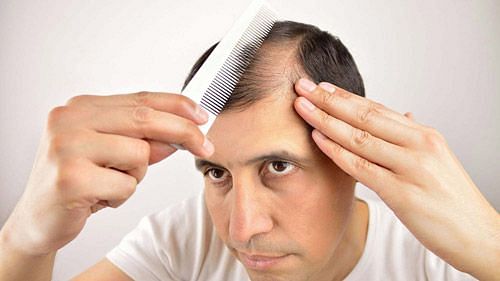5 Reasons Your Hair is Falling Out
In most cases. the problem of hair fall is observed among men after the age of 25 because the hormones start to take a toll on the hair roots, making it thinner and thereby manifesting male pattern baldness.

Patients perceive their hair is falling out either when they notice a receding hairline or if they feel that the overall volume of their hair is decreasing or the skin on the crown of head is beginning to show.
They begin to notice more hair fall on a daily basis either while taking a shower or while combing your hair. Patients also often get alarmed by noticing hair on their pillow or over the drain at the end of a shower.
Any of these tell-tale signs make a patient concerned about hair loss. Hair plays an important role in the aesthetic appearance of an individual and that is why patients get concerned if they notice such hair depreciation.
It is seldom known that shedding 50 hair strands in a day is completely normal because the hair follicles go through a continuous cycle of growing and shedding however if the shedding is more than that it can result in loss of volume which results from the shedding of hair and not from the thinning of hair.
There are 100,000 to 150,000 hairs distributed over the style of an adult head and it would be normal to lose even up to hundreds of them a day. The reason one should not be alarmed by this is because 90% of the hair would be in the growing phase.
Each parent has an active growth phase which is called anagen phase that can last for 2 to 6 years after which it goes through a transitional phase which is called catagen that can last 2 to 3 weeks and finally the hair shades and enters a resting phase which is called telogen and this lasts for about two or three months after which a fresh cycle of growth is initiated. There are various factors that influence the duration of the growth cycle which we shall discuss below.
In most cases, the problem of hair fall is observed amongst men after the age of 25 because the hormones start to take a toll on the hair roots making it thinner and thereby manifesting androgenic alopecia ( male pattern baldness) which is the most common cause of hair loss in men. It affects at least a quarter of the male population post the age of 25 and up to 40% of men by the age of 40. However, androgenic alopecia is not the only cause of hair fall and there are several other reasons that can contribute to it as well.
5 Reasons your hair is falling out
1.Androgenetic Aloepcia
Androgenetic alopecia is a condition in which there is gradual thinning of the root which results in the conversion of the terminal hair into intermediate hair which on further continuous damage convert into vellus hair and eventual cessation of the growth cycle. Enzyme 5 alpha-reductase converts testosterone to dihydrotestosterone, which is the principal androgen involved in the pathogenesis of androgenetic alopecia in men.
What to do – There are medications available which decrease the production of dihydrotestosterone from testosterone. There are also shampoos and lotions containing ingredients which can decrease this conversion at the root level. These help to intervene in the pathway of the pathogenesis of the condition and thereby reverse the damage happening to the roots.
2.Nutritional Deficiencies
Proper nutritional intake is important for optimal hair root activity and healthy hair formation. Deficiency in nutritional intake can also result in hair loss. Iron, zinc, proteins and certain vitamins play a key role in the hair root metabolism and proper food intake is required.
What to do – Foods that are known to promote hair growth include eggs for protein, berries for vitamin C, spinach which is rich in folate iron and vitamins, fish as it is a good source of omega-3 fatty acids, avocado for vitamin E, nuts can provide a variety of B complex vitamins along with zinc and essential fatty acids.
3.Telogen Effluvium
This is a condition in which there is excessive shedding of hair and the patient can notice a definite increase in the number of hair strands that are lost over the course of a day and this progressive loss of hair strands leads to thinning of the volume over the entire scalp. This sudden increase in the number of hair shedding is commonly seen due to the result of a stress which tends to destabilise the hair cycle. The stress can be either mental or physical. Presence of mental stress and personal life and professional life can have an impact on the hair cycle. Physical stress due to presence of an illness or certain medications (isotretinoin, antidepressant, antihypertensive, lipid lowering medication,etc) can also lead to increased hair fall.
What to do – To avoid the stress-related hair shedding patients need to avoid and decrease the impact of these stressors. Anti hair fall shampoo and serums are available to decrease the impact of stress on the hair root and thereby decrease the hair fall.
The patient can combine this with the use of a derma roller to regrow lost hair.
It is a form of micro-needling that manages hair fall and improving hair growth especially when your derma roller is clean and sterilized.
4. Alopecia Areata
This is a common condition which is seen in approximately 1 in 50 people and presents with sudden loss of hair in a patch over the scalp and sometimes it may also happen on the body like the eyebrows, eyelash, beard or body hair as well. This is an autoimmune condition in which there is no permanent damage to the follicle but the growth phase of the route is arrested and that is why there is the patch without any outgoing hair in the area.
What to do – A study published in 2002 showed that onion juice may be used as a home remedy for the treatment of alopecia areata. There are multiple treatment modalities available for this condition for which a dermatologist opinion may be sought.
5.Anagen Effluvium
If a patient is on heavy medication for chemotherapy or radiation therapy or under treatment for autoimmune diseases the medication can lead to increase shedding of hair not just from the head but also from other parts of the body like the eyebrows or eyelashes also.
What to do – If the patient experiences such symptoms the treating physician should be informed so that an assessment can be done and alternative medicine may be used if possible.
Proper assessment and right approach is the key to diagnosis and correct treatment. If a patient is going through troubling times and experiencing problems with your hair it is imperative to seek an opinion from a qualified certified dermatologist who are the right specialist for dealing with these issues.


